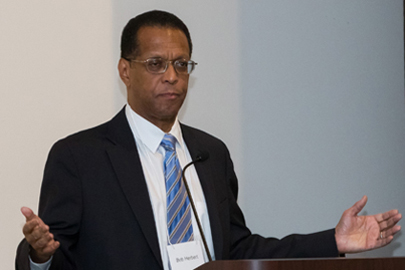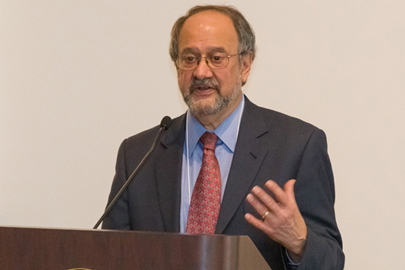Herbert, Kuttner say war on poverty is being lost
Nearly one-third of the county is poor or near poor, Herbert says

Bob Herbert

Robert Kuttner
After a decade of gains, America is losing the war on poverty as nearly one-third of the country is poor or nearly poor, according to former New York Times op-ed columnist Bob Herbert.
During his closing plenary address at a one-day conference at Brandeis on poverty in America, Herbert told a crowd of about 150 scholars, students and community activists at the Hassenfeld Conference Center that government intervention was needed immediately to help reverse the economic decline of some 100 million people.
“We’re in denial about just how bad things have gotten,” said Herbert, who left the Times in 2011 and is now a distinguished senior fellow at Demos, a progressive think tank in New York. “People run to the shelter of denial when they can’t contemplate the truth.”
The conference, “(Re)Discovering Harrington’s ‘The Other America’: A Symposium on Poverty Since the Great Society,” assessed the strides that the United States has made since the 1962 publication of progressive political activist Michael Harrington’s eye-opening book reporting that 25 percent of the nation lived in poverty.
“The Other America” illuminated the plight of the poor and helped inform President Lyndon B. Johnson’s subsequent Great Society legislation. Many observers trace Medicaid, Medicare, food stamps and expanded social security benefits to Harrington’s ideas.
Since the 1960s and ’70s, when programs were enacted to pull poor citizens out of poverty, “poverty has mounted a fierce comeback,” Herbert said. “Many of the gains that were made in the years after the publications of ‘The Other America’ have been reversed.”
Quoting Dissent founder Irving Howe, a former member of the Brandeis faculty who wrote the introduction to Harrington’s book, Herbert asked, “How can we continue to allow this scandal to continue to fester?”
During his talk, “Moving Beyond ‘The Other America,’” Herbert told conference attendees that the growing number of Americans living below the poverty line has much more to do with “a long series of public policy decisions that hurt the many in favor of the few” than with the state of the economy.
Because change will not come from the politicians in Washington, D.C., Herbert said the impetus to resume the fight against poverty will need to germinate with people coming together.
“We have to transform the United States and make it a place that allows everyone to flower,” said Herbert, whose wife, Deborah Bial ’87, H ’12 established the Posse Foundation, a pioneering college-access initiative.
Robert Kuttner, founder and editor of The American Prospect and a distinguished senior fellow at Demos, opened the program with the luncheon keynote, “Reflecting on the Politics of Poverty in the 50 years since ‘The Other America.’”
He told conference attendees that many middle-class Americans have grown disenchanted with the Democratic Party for its failure to deliver programs and have turned to the Republican Party. Although voting for Republicans is not in their economic self-interest, Kuttner said, they do so because of the party’s stance on other issues, which he characterized as “guns, gods and gays.”
Following lunch, Brandeis faculty and community activists jointly led breakout sessions that examined four topic areas: labor and employment, housing and foreclosure, the safety net and beyond, and student debt and college completion.
Brandeis faculty and students led a panel discussion that focused on the racial wealth gap, children in poverty, women and poverty and undocumented youth.
The conference was sponsored by the MPP Poverty Alleviation Program at the Heller School for Social Policy and Management and the Louis D. Brandeis Legacy Fund for Social Justice.
Categories: Humanities and Social Sciences





